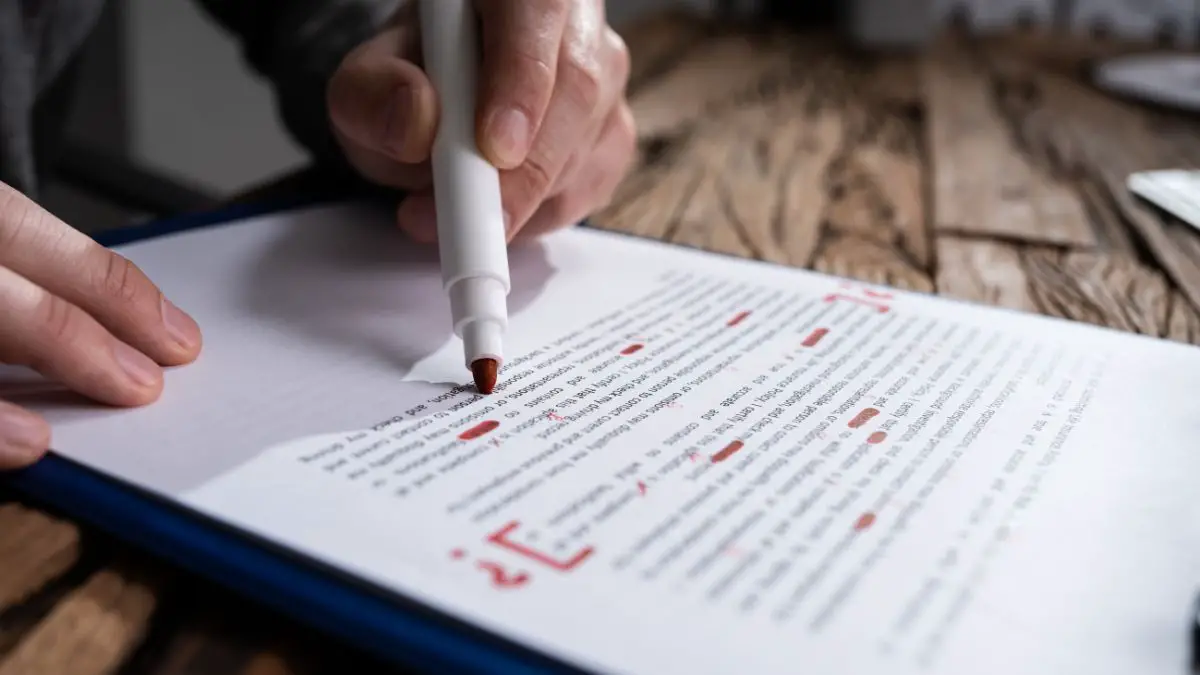Table of Contents
- Introduction to Proofreading
- 1. The Role and Responsibilities of a Professional Proofreader
- 2. Skills Required to Become a Successful Proofreader
- 3. Educational Qualifications and Training
- 4. Gaining Experience and Building Your Portfolio
- 5. Landing Your First Job as a Professional Proofreader
- 6. Growing as a Professional Proofreader
- Conclusion
Introduction to Proofreading
Becoming a professional proofreader requires a lot of skills and aptitudes. At its core, proofreading is reviewing and correcting written material to ensure accuracy. It’s not just about spotting typos or punctuation errors; it involves checking for consistency in layout and style, ensuring the right tone and voice, and even verifying facts.
You have a proofreader to thank if you’ve ever read a book, an article, or a menu without any glaring mistakes.

The importance of proofreading extends across various fields. In academic publishing, proofreaders ensure error-free research papers and dissertations and meet formatting guidelines. They help create professional reports, proposals, and marketing content in the business world.
In journalism, they maintain the credibility of publications by eliminating errors and inaccuracies. Without effective proofreading, the message can be lost or distorted, leading to misunderstandings and miscommunication.
This write-up guides you in becoming a professional proofreader. We will explore the role and responsibilities of a proofreader, discuss the skills required, dive into the educational qualifications and training necessary, and offer guidance on gaining experience and building your portfolio.
But that’s not all; we will also provide tips on landing your first job as a proofreader and suggest ways for continuous learning and growth in this field.
So, whether you’re a language enthusiast considering a career in proofreading or simply looking to improve your writing skills, this comprehensive guide aims to equip you with the knowledge and tools necessary to step confidently into professional proofreading.
1. The Role and Responsibilities of a Professional Proofreader
Understanding a proofreader’s key roles and responsibilities is essential if you are keen on becoming a professional proofreader. The job of a proofreader extends beyond simply catching typographical errors. They act as the final line of defense, ensuring flawless content before it reaches its audience.
Job Profile of a Professional Proofreader
A professional proofreader is primarily responsible for reviewing, correcting, and enhancing text. They look out for grammatical mistakes, spelling errors, punctuation errors, and syntax issues. Even minute details such as inconsistent formatting, incorrect page numbers, or misaligned headers and footers fall under their scrutiny.
Another important aspect of a proofreader’s role is to check for consistency in the style, voice, and flow of the content. For instance, they ensure that the capitalization rules are followed consistently, the tone remains the same throughout, and the content flows logically from one point to another.
Proofreaders often work with style guides like The Chicago Manual of Style, APA Style, or MLA, depending on the field they are working in. These guides provide standards for writing and formatting. They ensure a consistent use of English writing (i.e., American English vs. British English).
Other tools of the trade include a good dictionary, a thesaurus, and specialized software that helps catch errors that might escape the human eye.
Where Proofreaders Fit in the Publishing Process
In the book publishing workflow, the proofreader’s role usually comes in after the content has been written, edited, and formatted. The proofreader steps in after the writer pours their thoughts onto the page, and the editor refines the content for clarity and impact. They meticulously comb through the document, looking for any minor errors that could detract from the quality of the final product.
Proofreading is the last step before publication. This places enormous responsibility on the proofreader, as any mistake overlooked will end up in the published content, affecting its credibility and professionalism.
The Impact of Proofreaders on the Final Product
Proofreaders play an integral part in the success of the final product. A document free of grammatical, spelling, and punctuation errors reflects professionalism and respects the reader’s time and effort. Readers are more likely to trust and value well-crafted and error-free content.
For businesses, error-free content can enhance their reputation and build customer trust. Accurate and polished papers can make all the difference between acceptance and rejection in academia. A thoroughly proofread book can lead to better reviews and more sales for authors. Hence, the work of proofreaders holds significant importance across various fields.
The role of a professional proofreader is multi-faceted and vital in the publishing process. Their keen eye for detail and commitment to perfection significantly contribute to the quality and success of the final product. As we proceed through this write-up, we will delve into the skills required to excel in this role, how to gain experience, and ways to grow as a professional proofreader.
2. Skills Required to Become a Successful Proofreader
Stepping into the world of proofreading requires a specific set of skills. While our previous section introduced you to the role and responsibilities of a professional proofreader, it is crucial to understand that these tasks cannot be performed without mastering certain abilities.
Hard Skills: Attention to Detail, Grammar, and Punctuation
First and foremost, proofreading demands an extraordinary level of attention to detail. This means skimming through a text and systematically examining each word, sentence, and paragraph to ensure they are error-free.
A successful proofreader can spot a misplaced comma, an incorrectly spelled word, or an awkwardly phrased sentence that most people would overlook.
Alongside this keen eye for detail, a strong grasp of grammar and punctuation is indispensable. You need to know the rules, everything from subject-verb agreement to correctly using colons and semicolons. Expertise in these areas allows a proofreader to ensure the author’s message is clearly and accurately conveyed.
The Ability to Work Under Tight Deadlines
Proofreaders often work under tight deadlines. This is especially true in fast-paced environments like newsrooms or advertising agencies. Therefore, producing high-quality work under pressure is another essential skill. It involves being organized, managing your time well, and staying focused even when the clock is ticking.
Soft Skills: Patience, Objectivity, and Communication
Now, let’s move on to some of the soft skills necessary in the proofreading field. Patience, for one, is incredibly important. Proofreading can be a meticulous and time-consuming task, demanding the patience to go through long documents line by line.
Objectivity is another key soft skill. As a proofreader, you must remain neutral and focus solely on the text’s correctness and clarity rather than getting caught up in the content or the writer’s point of view.
Lastly, good communication skills are a must. Proofreaders often work closely with authors, editors, and other team members. They must articulate their findings and suggestions clearly and diplomatically, ensuring that corrections and changes are understood and accepted without causing offense.
Proofreading requires a balance of hard and soft skills, ensuring the final product is polished, professional, and error-free. You will be well on your way to becoming a professional proofreader by honing these skills. But remember, these skills alone may not be enough.
In the next section, we’ll explore the educational qualifications and training typically required for a career in proofreading.
3. Educational Qualifications and Training
Embarking on a career in proofreading often begins with the right educational background and training. While no specific degree is required to becoming a professional proofreader, having a solid foundation in language and communication can be invaluable.
Many successful proofreaders possess degrees in English, Journalism, Communications, or related fields. This formal education helps them gain an in-depth understanding of language structure, grammar, and punctuation – all crucial components of proofreading.
However, it’s important to note that a degree alone is not enough.
Specialized training in proofreading allows you to hone your skills, understand the intricacies of the job, and stay updated on industry standards.
Classroom-based courses provide a traditional learning environment where direct interaction with instructors and peers can enhance understanding. On the other hand, online courses offer flexibility, allowing you to learn at your own pace and convenience.
Online Courses
Numerous online platforms offer courses specifically designed for aspiring proofreaders. These courses cover various aspects of proofreading, from understanding grammatical nuances to mastering proofreading symbols. Notable platforms include Coursera, Udemy, and LinkedIn Learning.
Some online courses even offer certification upon completion, which can be a great addition to your resume. However, ensure that you choose a course that provides comprehensive and practical knowledge. Look for courses that offer practice exercises and feedback, as this real-world experience can be instrumental in refining your skills.
Offline Courses
Consider enrolling in offline or classroom-based courses if you prefer a more hands-on learning experience. Traditional educational institutions, like universities and colleges, often offer certificate programs in editing and proofreading. Community centers and adult education providers may also have suitable courses.
Offline courses typically involve more interactive and immersive learning experiences, with group activities, workshops, and one-on-one sessions with instructors. They can provide invaluable networking opportunities, connecting you with professionals in the field and potentially leading to job opportunities.
Becoming a professional proofreader requires a combination of the right educational background and specialized training. With many online and offline courses available, you can find a program that fits your learning style and schedule. Remember, continuous learning and skill refinement are essential in this field, as they keep you up-to-date and competitive in the ever-evolving publishing world.
4. Gaining Experience and Building Your Portfolio
As you embark on your journey to becoming a professional proofreader, one of the most vital steps is gaining practical experience and building a robust portfolio. This section will provide insightful suggestions to help you gain hands-on experience and tips to create an impressive proofreading portfolio, which could be your golden ticket to attracting potential employers.
Gaining Practical Experience
It’s crucial to get real-life experience to hone your proofreading skills. There are several ways you can do this. Volunteering is one such method; many non-profit organizations, local newspapers, or community newsletters often require proofreaders.
Offering your services for free helps them out and provides you with valuable experience and a chance to apply what you’ve learned.
Internships can also offer a wealth of experience. They provide an opportunity to work in a professional setting, giving you a glimpse into the daily activities of a proofreader. Additionally, internships often become full-time job offers, making them worthwhile.
Freelance work is another excellent way to gain experience and flexibility. Websites like Upwork or Freelancer have numerous proofreading jobs you can undertake based on your schedule. As you complete more projects successfully, your reputation as a competent proofreader grows, opening up more opportunities.
Building Your Portfolio
A well-curated proofreading portfolio can make a significant difference when applying for jobs. Your portfolio should showcase your range of skills, attention to detail, and understanding of grammar and punctuation. Include any work you’ve done, whether it was paid or voluntary.
One way to build your portfolio is by creating before-and-after work samples. You can take a piece of text, proofread it, and then display the original and corrected versions side by side. This allows potential employers to see firsthand how you can transform a piece of writing.
Remember to update your portfolio as you gain more experience continually. It should reflect your growth as a proofreader and highlight your most recent achievements. A well-maintained portfolio demonstrates your commitment to the profession and drive to improve.
Ultimately, gaining experience and building your portfolio go hand in hand. The more experience you gain, the more robust your portfolio becomes, increasing your chances of landing a coveted proofreading job.
5. Landing Your First Job as a Professional Proofreader
Now that you’ve honed your skills gained experience, and have a strong portfolio, it’s time for the next big leap – landing your first job as a professional proofreader.
Searching and Applying for Proofreading Jobs
The first step is knowing where to look for proofreading jobs. Online platforms such as LinkedIn, Indeed, and Upwork regularly post job listings for proofreaders.
Don’t forget to explore publishing companies’ websites, as they often have career pages with open positions. Joining professional networks or communities, like the Editorial Freelancers Association (a not-for-profit organization based in New York), can also provide valuable job leads and networking opportunities.
When applying, tailor your cover letter and resume to highlight your proofreading skills and experiences relevant to each job. Remember to include examples from your portfolio that best demonstrate your abilities. But don’t just list your credentials; explain how they will bring value to the prospective employer.
Be sure to proofread your application thoroughly—it would be ironic for a proofreader to submit an application with errors!
Preparing for Job Interviews and Understanding Employer Expectations
Once you’ve sent out applications, it’s time to prepare for potential interviews. Research the company beforehand to understand its work culture, products, and services. Prepare answers for common interview questions, keeping the focus on your proofreading skills, attention to detail, and ability to meet tight deadlines.
Employers typically look for proofreaders with excellent language skills and a keen understanding of their target audience. They appreciate proofreaders who can contribute to the overall quality of the final product, not just by catching typos but also by enhancing readability and ensuring consistency in style and tone.
It’s also important to show your willingness to receive feedback and continuously improve. Proofreading, after all, is a process of constant learning and adaptation. Don’t shy away from discussing mistakes you’ve made in the past, but always highlight what you learned from these experiences.
Landing your first job as a professional proofreader might require patience and persistence, but remember, every “no” is one step closer to a “yes.” So keep improving, apply, and most importantly, don’t lose confidence in your skills.
6. Growing as a Professional Proofreader
Embarking on a career in proofreading is just the start of an exciting journey. Like any profession, proofreading has plenty of opportunities for growth and development. But what does this growth look like, and how can you ensure you’re always improving? Let’s dive in.
Prospects for Advancement in the Proofreading Field
The world of proofreading is vast and varied, offering a wide range of possibilities for advancement. In many organizations, proofreaders can climb the ladder to become senior proofreaders, team leads, or even managers of editorial departments.
This progression often involves increased responsibilities, such as coordinating proofreading tasks among a team or liaising with authors and publishers.
Furthermore, with years of experience and a solid reputation, professional proofreaders can also branch out into freelance consulting, providing crucial services to many clients.
Continuous Learning and Improvement
Becoming a professional proofreader doesn’t end after landing your first job. It is a career-long commitment to learning and improvement. The English language is dynamic, and style guides are regularly updated, so keeping pace with these changes is crucial.
Attending workshops, webinars, and industry conferences is another excellent way to continue learning. These events provide valuable knowledge and offer networking opportunities that could open doors to new possibilities.
Becoming a successful professional proofreader is an ongoing journey. It requires dedication, continual learning, and a passion for perfection. As you gain experience, build your portfolio, and continue to learn, you’ll find plenty of opportunities for growth and advancement in the exciting world of proofreading.
Conclusion

In this comprehensive exploration of proofreading as a professional pursuit, we have delved into many aspects that contribute to making a successful proofreader. Let’s revisit some of the key takeaways from this journey.
A Recap of Building Blocks for Proofreading
We began by understanding what proofreading is – a critical final step in the publishing process where meticulous attention to detail is employed to identify and correct mistakes in text. Proofreaders are often the unsung heroes, ensuring clarity and accuracy in various fields, be it literature, academia, marketing, or legal documentation.
Our exploration led us through the responsibilities of a proofreader, their vital place in the publishing ecosystem, and their significant impact on the quality of the final product. We also dissected the skills necessary for success in this field – an excellent grasp of grammar and punctuation rules, a sharp eye for detail, patience, objectivity, and proficient communication skills.
Education, Experience, and Job Hunting
On the educational front, we discussed the varied backgrounds that can lead one to a career in proofreading. We considered the value of specialized training through numerous online and offline courses designed to polish the proofreading prowess of aspiring professionals.
Furthermore, we delved into strategies for gaining practical experience and building a formidable proofreading portfolio, from volunteering and internships to freelance projects. We provided guidance on job searching, application processes, interview preparation, and what employers typically seek in a professional proofreader.
The Journey Ahead
Lastly, we highlighted the prospects for growth and advancement in this field, emphasizing the importance of continuous learning and improvement in shaping your career as a proofreader.
In conclusion, the road to becoming a professional proofreader is paved with dedication, learning, practice, and patience. The field offers immense potential for those with a knack for languages and a passion for perfection. So, why wait? Take the first step today!
Whether enrolling in a course, taking up a volunteer proofreading gig, or simply practicing your skills on written material around you, every small step brings you closer to your goal. Remember, every expert was once a beginner.

2 thoughts on “Becoming a Professional Proofreader: 6 Key Tips”